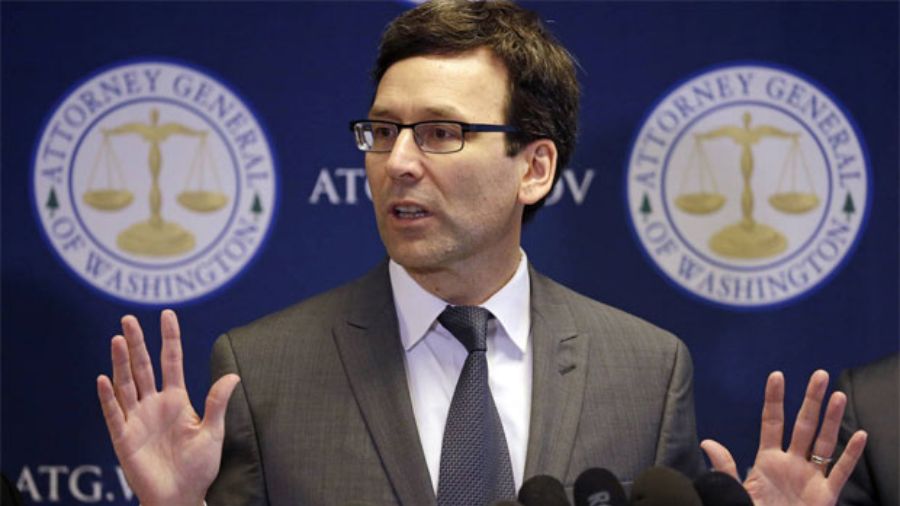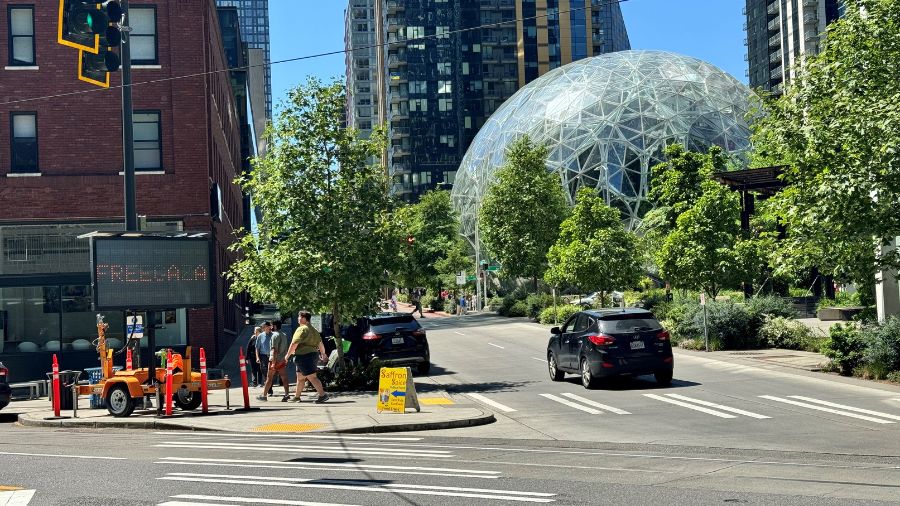Snohomish County eyeing ordinance that bans cashless businesses
Sep 12, 2023, 11:29 PM

A ,man counts banknotes at currency exchange shop. (Photo by Murtaja Lateef via Getty Images)
(Photo by Murtaja Lateef via Getty Images)
Cashless retailers within unincorporated Snohomish County could soon be barred if a new ordinance requiring all businesses to accept cash passes.
The ordinance has a limit of up to $200.
“If somebody wants to go and buy a car off of a car lot, they can’t expect the business to take cash for that full car, so it’s up to a $200 limit,” Snohomish County Council member Nate Nehring told Jason Rantz on KTTH 770 AM. “There’s not a requirement on the business for how much cash they have to keep on hand, but those are the particulars of it. And, through conversations with local businesses with Chambers of Commerce and Economic alliances, we’ve had some other suggestions from the business community that have been incorporated into the ordinance through some amendments.”
More on cashless businesses: State suggests cashless apps for cannabis stores to avoid robbery
One of the amendments included was an exemption for businesses that are not face-to-face, while another clarifies business procedures amid future public health emergencies.
The decision to force businesses to accept cash could protect anyone unbanked or underbanked — those without access to credit cards, personal checks or bank accounts or those who don’t meet the minimum requirements necessary to open a bank account.
Unbanked rates were higher among lower-income households, less-educated households, Black households, Hispanic households, working-age households with a disability, and single-mother households, according to the Federal Deposit Insurance Corporation (FDIC). Eighty-one percent of adult Americans are fully banked, while 13% are underbanked and 6% are unbanked.
American residents between the ages of 35 and 44 use cash for only 13% of their purchases, according to a study by MoneyTransfers. The study also found that 16% of Americans carry cash with them at all times.
The number of Americans who make most of their purchases in cash has been cut in half, from 25% in 2017 to 13% in 2022, according to Gallup. That has causing businesses to follow the trend. The average cash transaction is $22, while the average credit card transaction is $112, according to MoneyTransfers.
The COVID-19 pandemic further accelerated the pivot from cash as companies searched for ways to maintain distance and safety while still allowing customers the ability to buy products.
“Why would you force a business that has that reasonable concern into opening themselves up to potentially being targeted for a crime at a time where Snohomish County is not immune to this?” Rantz asked.
More from Jason Rantz: Bodycam video released of Seattle police officer’s out-of-context statements
“We’ve heard a lot from businesses, like big box retailers, about people going in, taking merchandise, and just walking out, and thanks to laws like our state’s police pursuit loss and a lot of circumstances, there’s not a whole lot that can be done about that, which is extremely frustrating for the businesses and the general public,” Nehring said. “But if we did have (the cash requirement) in the future, there is a provision that’s being built. King County does something similar where if there’s a worry about potential robbery or something to that effect, then an exemption can be applied for.”
King County passed similar legislation in June.
Cannabis businesses are on the other side of the issue, waiting for federal limitations preventing these businesses from taking forms of payment other than cash to be relinquished. Because cannabis is federally illegal, cannabis retailers can not take credit or debit cards, pending some exceptions.
This reliance on cash alone has made them a target for armed robberies, which have spiked over the last several years. That includes an incident where an employee was murdered in Tacoma in 2022.
More on cash-only cannabis businesses: Lynnwood pot shop owner said thieves caused over $100K in damages
Nehring claimed that while the ordinance hasn’t had a final vote yet, there has been zero opposition to this plan in his conversations with other council members.
A public hearing on the proposal will be held at 10:30 a.m. Sept. 20 in the Jackson Board Room on the county campus or remotely through Zoom.
Listen to The Jason Rantz Show on weekday afternoons from 3:00 p.m.-7:00 p.m. on KTTH 770 AM (HD Radio 97.3 FM HD-Channel 3). He is the author of the book “What’s Killing America: Inside the Radical Left’s Tragic Destruction of Our Cities.” Subscribe to the podcast. Follow @JasonRantz on X, formerly known as Twitter, Instagram, and Facebook. Check back frequently for more news and analysis.














